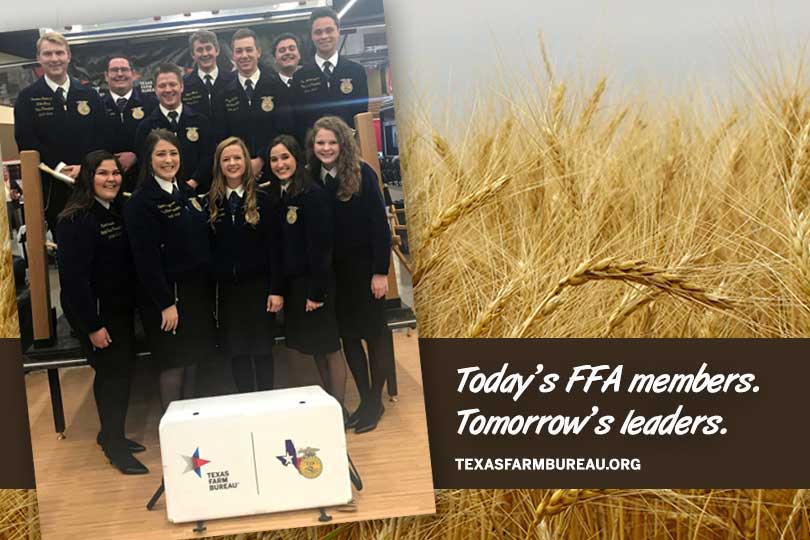By Julie Tomascik
Editor
Texas agricultural science teachers gear up for another school year as their annual professional development conference comes to an end.
More than 2,100 teachers, vendors and guests were in attendance for the weeklong conference.
“It’s a record number for our event,” Barney McClure, Vocational Agricultural Teachers Association of Texas executive director, said. “A number of districts have added agricultural science teachers, and many schools have brand new programs this year, too.”
During the conference, teachers attended workshops on various topics, including floral design, principles of agriculture, students’ learning styles and agricultural mechanics.
Texas Farm Bureau (TFB) staff also presented a workshop.
“We discussed the opportunities for teachers and students, along with the resources available through Texas Farm Bureau,” Mia Balko, TFB director of Youth and Urban Outreach, said. “We can offer the help and assistance of county Farm Bureaus, but this also gives us the chance to offer content from our publications, communications experts and resource staff.”
Students can participate in the Youth Leadership Conference and Free Enterprise Speech Contest, as well as apply for scholarships, Balko noted.
TFB provides staff and resources for helping with FFA’s elite training programs, like the Ford Scholars and the LEAD teaching experience.
TFB’s Mobile Learning Barn was also displayed in the exhibit area.
Although the workshops and exhibits are a key part of conference activities, McClure said the networking and mentoring opportunities available to teachers are just as important.
“This conference is a time for our teachers to network, share ideas and get energized for a new school year,” he said.
He estimated 180,000 students in Texas are involved in one or more agricultural classes.
“In agricultural education, we have something that reaches a wide variety of students,” McClure said. “We’ve had some legislation in the last couple of sessions that strengthened our programs, and we have more students taking agricultural courses today than ever in the history of our state. Some agricultural courses can count for science, math, fine arts and speech credit.”
McClure noted that relationships with TFB and county Farm Bureaus are important as agricultural education grows in urban and suburban areas.
“The relationship between ag science teachers, FFA and Texas Farm Bureau is strengthening,” McClure said. “Some of our teachers weren’t raised on a farm, so building connections with area farmers and ranchers and with Texas Farm Bureau can be extremely beneficial.”
That relationship and the impact of teachers’ role in the classroom was highlighted by Texas Farm Bureau President Russell Boening in his address to the teachers.
“There is nothing I can think of that is more important for the future of agriculture than your everyday contact with those young men and women who pass through your program,” Boening said. “We trust the future is bright for agriculture because of the work you do in molding FFA members to be strong, contributing members of society.”
Farm Bureau, Boening said, is made up of many former FFA members. It’s where many in agriculture find their first opportunities for leadership and growing agricultural knowledge.
“Leadership is one of those words that’s easy to say but hard to deliver,” Boening said. “FFA helps its members become not only future leaders of our country but also leaders in our communities. It prepares them well to be a strong and trusted voice of Texas agriculture for the future.”
That leadership starts in classrooms with agricultural science teachers, but it also takes assistance from groups like Farm Bureau.
“We all must work together to stress the importance of communicating the issues and goals of agriculture to every person in our sphere of influence,” Boening said.
He discussed the ongoing effort between TFB, Texas FFA and Texas 4-H to help youth find their voice to become advocates for agriculture.
TFB provided memberships to the organization for all FFA chapters and 4-H clubs in the state.
“We believe this was the start of a new era in communication between our organizations,” Boening said. “Our advocacy programs will take a great leap forward as we learn to make FF


We would like information about the mobile learning barn coming to our elementary school.
Hi Dana – You can contact your local county Farm Bureau office, email MLB@txfb.org or call 254-751-2273 for more information on the mobile learning barn. Thanks!